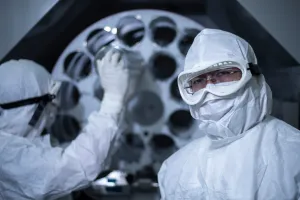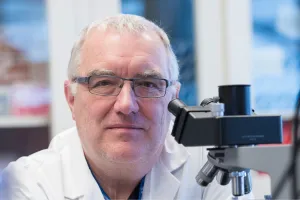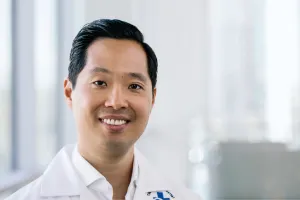Catching cancer at its sneakiest moment
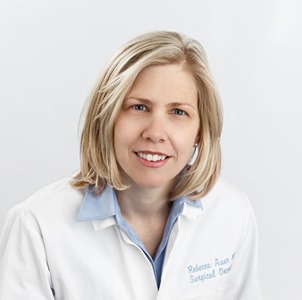 "Post-operative immune suppression is widely recognized, but there's currently no approved therapy to give patients around the time of surgery," says Dr. Rebecca Auer, winner of the Chrétien Researcher of the Year Award. "My research aims to understand why the immune system doesn't work after surgery and find therapies to boost it."As a surgical oncologist and laboratory scientist at The Ottawa Hospital, Dr. Rebecca Auer has the unique ability to remove patients' tumours, study them in the lab, develop new treatments and test them in clinical trials. And that's exactly what she's done, resulting in six innovative clinical trials over the last decade.
"Post-operative immune suppression is widely recognized, but there's currently no approved therapy to give patients around the time of surgery," says Dr. Rebecca Auer, winner of the Chrétien Researcher of the Year Award. "My research aims to understand why the immune system doesn't work after surgery and find therapies to boost it."As a surgical oncologist and laboratory scientist at The Ottawa Hospital, Dr. Rebecca Auer has the unique ability to remove patients' tumours, study them in the lab, develop new treatments and test them in clinical trials. And that's exactly what she's done, resulting in six innovative clinical trials over the last decade.
"As a surgeon, I take cancers out, but I don't really change the disease," explains Dr. Auer, who is also the head of cancer research at The Ottawa Hospital and a professor at the University of Ottawa. "If I'm lucky, and the cancer allows it, taking it out will cure them, but sometimes patients come back to see me, and the cancer's back, and it's a devastating moment. It's so sinister and sneaky. After surgery is exactly when those little cancer cells can take hold."
Dr. Auer and her team have discovered that surgery stresses the body and weakens the immune system and any cancer cells that remain after surgery can take advantage of this and begin forming a new tumour.
Targeting cancer after surgery could prevent recurrence
While the period of surgical recovery is a vulnerable time in a patient's cancer journey, it also represents an incredible opportunity. If researchers could strengthen the body's immune system in the first few days and weeks after surgery, it could dramatically improve the success of cancer surgery and prevent cancer from coming back.
"Post-operative immune suppression is widely recognized, but there's currently no approved therapy to give patients around the time of surgery," says Dr. Auer. "My research aims to understand why the immune system doesn't work after surgery and find therapies to boost it."
Clinical trial changes practice in an unexpected way
One of the first avenues Dr. Auer explored was the ability of cancer cells to hide from the immune system by coating themselves in fragments of blood clots. She hypothesized that a naturally occurring compound called heparin might be able to clear these blood clot fragments away and make cancer cells more susceptible to the killing by the immune system. The heparin worked very well in preclinical animal models, so together with hematologist Dr. Marc Carrier, she conducted a clinical trial to test this hypothesis in patients.
Cancer patients already take heparin after surgery to prevent blood clots, but there has been significant debate among surgeons about how long the heparin treatment should continue. The trial, which compared different lengths of heparin treatment, had the potential to solve this debate as well.
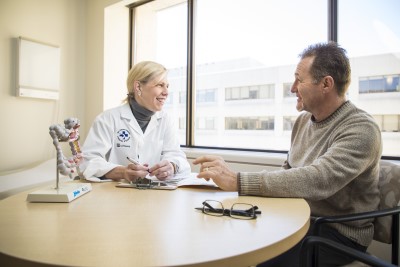 "We have come a long way in unravelling this phenomenon and each clinical trial teaches us more," says Dr. Auer. "I'm very thankful for all the collaboration and support we received, as well as for all the patients who have participated in our clinical trials."In the end, the trial recruited more than 600 patients with colorectal cancer from 12 Canadian centres. The results were published in top medical journal The BMJ in 2022.
"We have come a long way in unravelling this phenomenon and each clinical trial teaches us more," says Dr. Auer. "I'm very thankful for all the collaboration and support we received, as well as for all the patients who have participated in our clinical trials."In the end, the trial recruited more than 600 patients with colorectal cancer from 12 Canadian centres. The results were published in top medical journal The BMJ in 2022.
"Interestingly, the trial was negative from the cancer point of view, in that it showed that a longer course of heparin didn't prevent cancer from coming back, but what it did show was that you don't need to give patients an extended treatment with heparin," says Dr. Auer. "So, it was practice-changing, even if it wasn't the result we were hoping to find."
Since starting this first trial many years ago, Dr. Auer and her team have continued to learn more about post-operative immune suppression and they have launched several more clinical trials.
"We have come a long way in unravelling this phenomenon and each clinical trial teaches us more," says Dr. Auer. "I'm very thankful for all the collaboration and support we received, as well as for all the patients who have participated in our clinical trials."
Check out this Q&A to learn more about Dr. Auer and what inspires her.
The Ottawa Hospital is a leading academic health, research and learning hospital proudly affiliated with the University of Ottawa and supported by The Ottawa Hospital Foundation.
Learn more about:
The Ottawa Hospital is a leading academic health, research and learning hospital proudly affiliated with the University of Ottawa and supported by The Ottawa Hospital Foundation.
